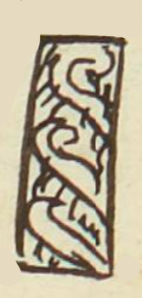Ilhuizol (MH897v)
This black-line drawing of the simplex glyph for the personal name Ilhuizol ("Feast Day" attested here as a man's name) shows a vertical rectangle with three speech scrolls tipped up at an angle. Hatching fills the space inside the rectangle that the scrolls do not occupy. The speech scrolls point to the verb ilhuia (to speak), which is a near homophone for ilhuitl (day). The -zol (referring to old things) is not represented visually.
Stephanie Wood
This is a rare example where speech scrolls are shown as written words, words put on paper. Most speech is visualized as oral, coming out of one's mouth.
The use of speech scrolls is attested here for the verb ilhuia (to say), a phonetic indicator to bring a reading of ilhuitl (day). We also have scrolls in this collection for the verb itoa (to speak), tlatoa (to speak), icahuaca (to murmur), and for the nouns chalani (talkative one), nahuatl (language), and tlatolli (word). Further, we have evidence that these scrolls can also represent tlacuiloliztli (writing).
Because ilhuia is a near homophone for ilhuitl (day), the speech scrolls that are associated with the pintor and the pintora, writer/painters, are taken to refer to the divinatory calendar, suggesting that they were writing the book of days (tonalpohualli). The scrolls are clearly multivalent.
Stephanie Wood
dio ylhuiçol
Diego Ilhuizol
Stephanie Wood
1560
Jeff Haskett-Wood
nombres de hombres

ilhuizol(li), a feast day, https://nahuatl.wired-humanities.org/content/ilhuizolli
ilhui(tl), day, https://nahuatl.wired-humanities.org/content/ilhuitl
zoltic, old, https://nahuatl.wired-humanities.org/content/zoltic
Matrícula de Huexotzinco, folio 897v, World Digital Library, https://www.loc.gov/resource/gdcwdl.wdl_15282/?sp=867&st=image
This manuscript is hosted by the Library of Congress and the World Digital Library; used here with the Creative Commons, “Attribution-NonCommercial-ShareAlike 3.0 License” (CC-BY-NC-SAq 3.0).








